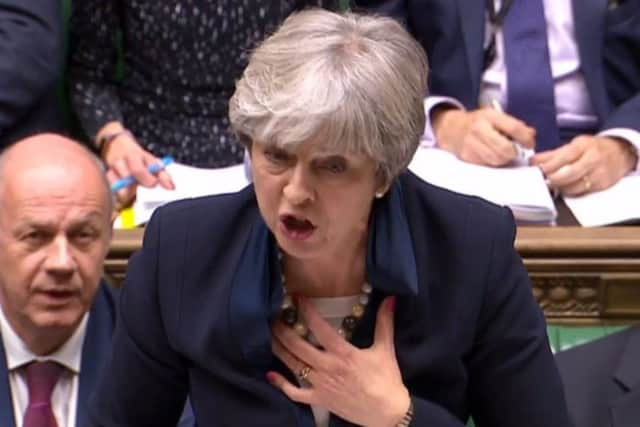What Theresa May's House of Commons defeat means for Brexit
The Prime Minister noted the Government has won 35 of 36 votes on amendments to the EU Withdrawal Bill, but last night’s defeat was as significant as any victory.
Mrs May was dealt a harsh lesson on what a handful of pro-remain Tories and a united opposition can do to a minority administration.
Advertisement
Hide AdAdvertisement
Hide AdThe move means parliament will now get a vote on the final deal thrashed out on the UK’s Brexit conditions, causing fury among Tory loyalists.


Strength in numbers?
One change that could come to fruition as Brexit talks between the UK and the EU move to stage two, is that MPs could be emboldened by the defeat they inflicted on the Government.
There remains precious little appetite for the Lib Dem proposal for another referendum - nor the SNP’s proposal to remain in the single market - but that doesn’t mean the parties won’t work together.


Labour’s whipping operation, in particular, has come along leaps and bounds since the snap general election in June, with just two of the party’s MPs rebelling yesterday.
The SNP will remain united on the issue, as they are on most others, and Theresa May’s working majority of ten when including her DUP allies, becomes even more fragile on matters relating to the Brexit deal.
We could see more and more defeats inflicted on the Government, especially if arch-Brexiteer David Davis continues to hint that deals with the EU aren’t necessarily binding.
Tory strife
Even before John Major’s infamous comment about the ‘bastards’ in his cabinet who caused problems over Europe, the Conservative party was badly divided on the issue.
When Mrs May, a Remain voter, took charge she appeared to have taken the party along with her with a message that seemed to say: we are all Brexiteers now.
Advertisement
Hide AdAdvertisement
Hide AdBut the position of the Tory rebels suggest that after her disastrous general election, MPs are inclined to be less generous with the Prime Minister.
Internal strife has already spilled over into the public, with Michael Fabricant claiming his fellow Conservative MPs should be ashamed of their decision.
Never knowingly understated, Nadine Dorries warned her colleagues that they had increased the danger of ushering in a ‘Marxist Government’.
Some Conservative commentators are even calling for the de-selection of the rebel MPs, which ringleader Dominic Grieve says has only hardened his resolve.
It’s another issue for Theresa May, David Davis, and co to consider as they thrash out the terms of their Brexit deal with EU leaders, as Tory divisions over Europe have ended the careers of leaders, even Prime Ministers, before.
The Scottish angle
The Budget was seen as the first timethe new bloc of Scottish Tory MPs worked as a group to gain concessions from the UK Government.
They were quick to tout their achievements, but were decidedly more quiet as the crucial vote loomed yesterday.
Paul Masterton of East Renfrewshire, previously labelled a “mutineer” by one pro-Brexit newspaper, abstained at the last minute, leading to SNP criticism.
Advertisement
Hide AdAdvertisement
Hide AdAside from Masterton - who represents a constituency which voted 75% to Remain in the EU - the Tory Whips’ office could ordinarily rely on the support of the 13 Scottish MPs.
The lack of rebellion from that group could fire up the SNP to paint the Scottish contingent as beholden to London bosses, even as more crucial Brexit votes loom.
The Scottish Conservative bloc, thus far steadily reliable, could be given more pause for thought on Brexit issue if that SNP argument gains traction, given every Scottish constituency voted to stay in the EU.
One vote won’t massively change the outlook on Brexit, but it is far from a trifling matter for Mrs May, who could yet face more defeats on the issue which will define her premiership.
